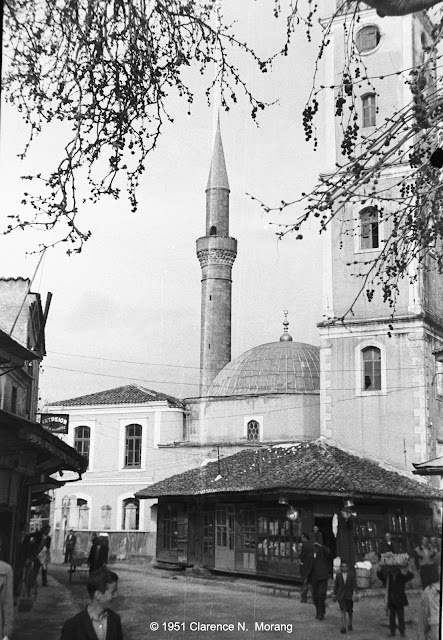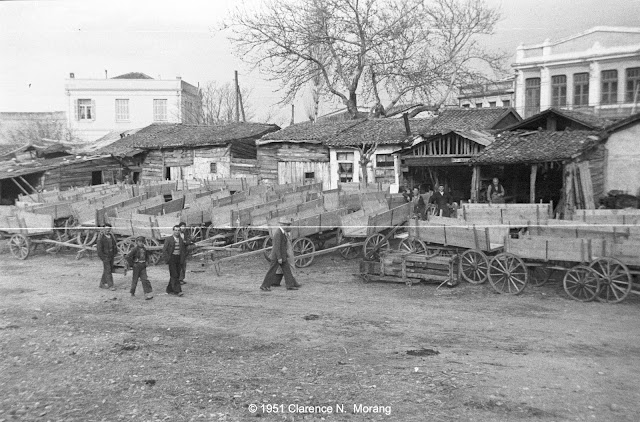When my dad first moved to Greece in 1951, he and some of the other engineers took field trips to northern Greece to look at rivers, irrigation canals, and waterworks. They also visited local engineering offices to obtain stream flow and discharge data. Sometimes they flew on a Grumman Goose airplane. I assume it was operated by the American Mission in the early 1950s.
One of the towns where they stayed was Komotini, a city in the region of East Macedonia and Thrace in northeastern Greece.
 |
| The New Mosque and Clock Tower, March 14, 1951 |
 |
| Note the stork on top of the bell tower |
 |
| The baker of Komotini - delicious loaves |
In 1951, Komotini was rather basic compared to the bright lights of Athens. My dad noted that accommodations were primitive and food grim. He also commented on the Turkish toilet. It sounds like it was a novelty to him, although surely he had encountered them before in Asia. I remember him telling me that when he asked for hot water to shave, the hotel host brought a tepid teacup of water.
 |
| Agricultural wagons |
 |
| What's the way to Athens? |
 |
| Muslim ladies of Komotini |
Komotini had a large Muslim minority. After the 1919-1922 military disaster in Anatolia, ethnic Greek and Turkish populations were
exchanged and moved (forced) back to their homelands. Many Greeks had never lived in mainland Greece, and many Turkish Muslims had not lived in Turkey. As noted in
Wikipedia, "Historians have described the exchange as a legalized form of mutual ethnic cleansing." It was a horrifying episode. But Komotini was not included in the forced exchange, so many Muslim families continued to live there. Two mosques are still active in town. The New Mosque (see the first photograph) has its own
web page.
 |
| Buklutzas River |
I had trouble finding this spot in Komotini. My family told me that the Buklutzas River has been covered over and is now the main highway through town. None of these buildings exist now. So much for progress.....
 |
| The cobbler of Komotini |
Note the gent with the overcoat walking away from the cameras is wearing a fez. In Turkey proper,
Mustafa Kemal Atatürk had banned the fez (to be replaced by the western fedora), but men continued to wear fezes in former Ottoman areas.
A short social note: After the brutal and vicious
Greek Civil War ended in 1949, towns in northern Greece were desperately poor. Many of the farmers lived on almost a subsistence basis from the produce they grew. My stepdad, a Greek surgeon, said many villagers had never seen a doctor or been to a dentist. Childbirth was dangerous and often led to death. Tuberculosis ravaged families. Appalachia in USA may have been similar at that time, with isolated towns and desperate poverty.
Today, towns like Komotini are clean and cheerful. Stores are well-stocked, streets clean and well-paved, buildings neat, and the townsfolk have bright little cars, decent clothes, and look happy and well-fed. They welcome tourists. They foregather at nice local restaurants and coffee shops. Their children have often been to college and many are bilingual.
Prime Minister Kyriakos Mitsotakis (Κυριάκος Μητσοτάκης)
told Fareed Zakaria at the World Economic Forum that on a day that is sunny, windy, not too hot, not too cold, Greece generates 90 percent of its electricity from renewable sources. Prime Minister Mitsotakis graduated from Harvard University, Stanford University, and Harvard Business School.
And today, Appalachia is still Appalachia, an underclass of grinding poverty, drugs, food insecurity, crumbling towns, racism, hatred, and despondency. What is wrong with this picture?
Photography: My dad took these these photographs on Ansco Super Speed film. One collector on Flickr states that this film was rated at ASA 100. He used his Canon rangefinder camera with a 50mm ƒ/1.9 Serenar lens. I remember this camera, but I sold it in the 1970s.








3 comments:
In response to the state of Appalachia; perhaps rabid capitalism is not so oppressive in Greece.
That is certainly possible. Greece has its ultra-wealthy class, but I have not seen the debilitating poverty or slums that you see today in hollowed out American cities or the rural South. I wish someone could explain it to me.
The Goose seems like it would have been the ideal means to get around the Greek Islands. I got to ride in one in the 1950s thanks to my uncle who was a pilot for some corporate types in Seattle. I remember it seeming very luxurious compared to the little single engine craft I had flown in up to that time.
Post a Comment